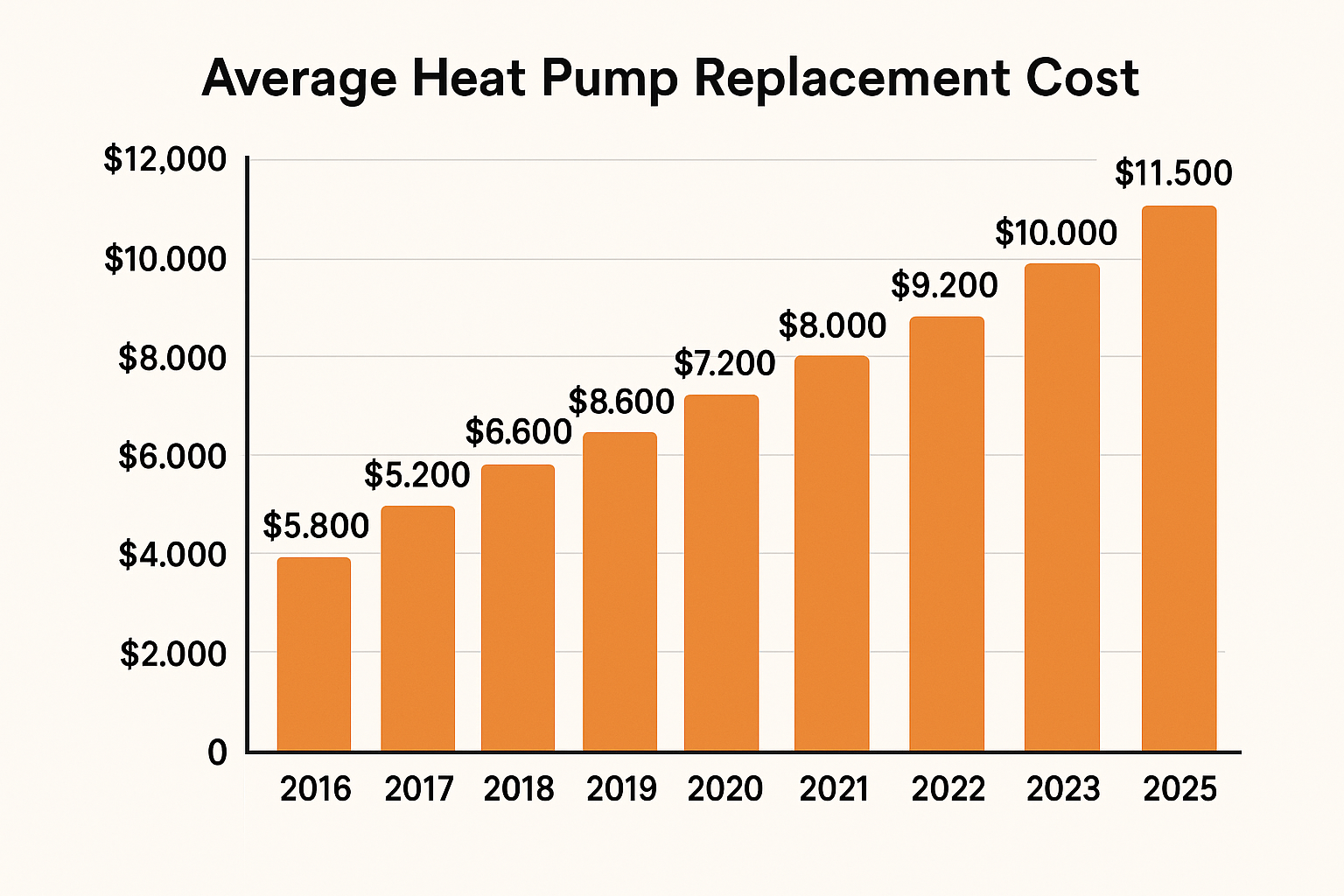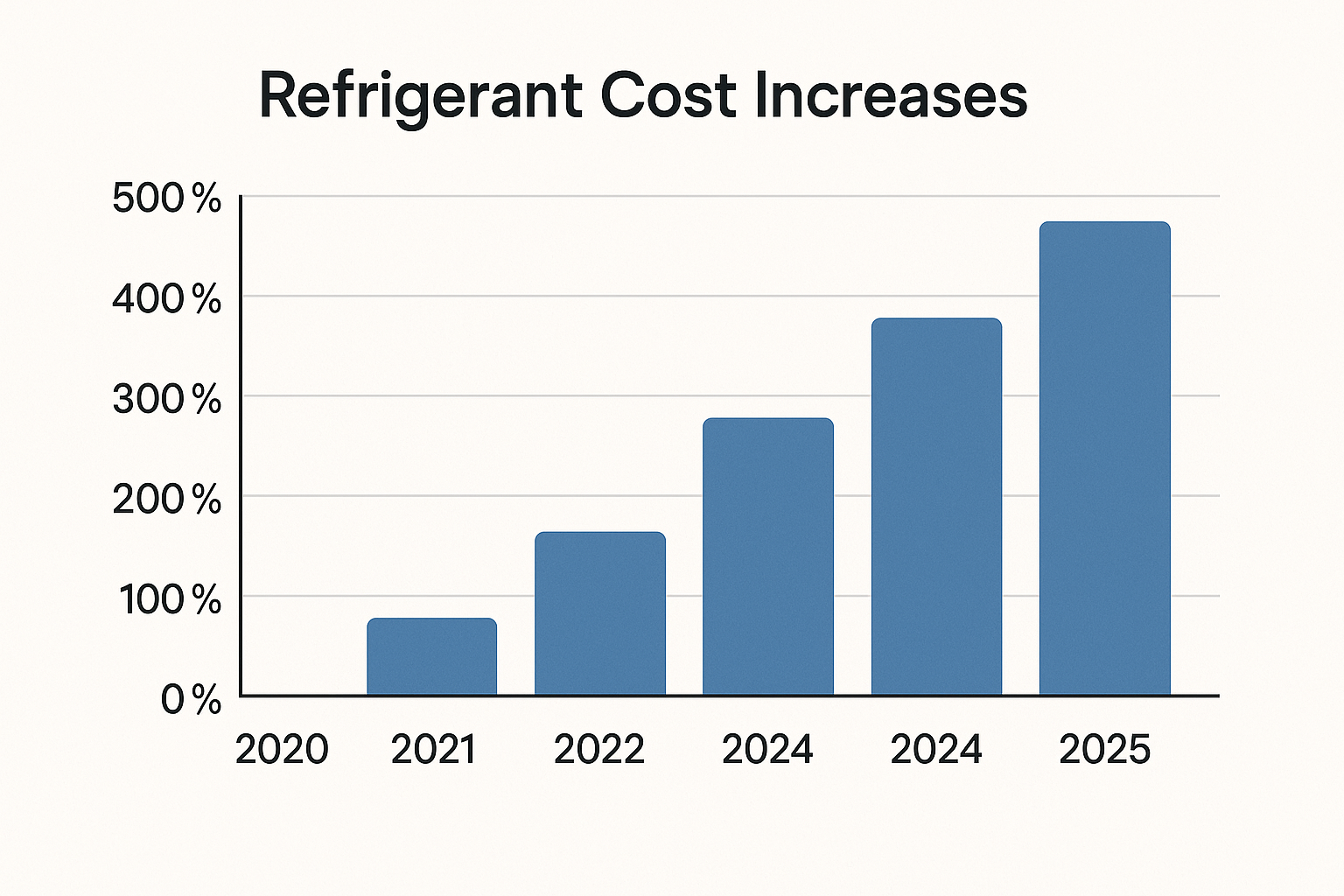When the weather turns cold, a failing heat pump isn’t something you can ignore. Replacing a heat pump isn’t cheap, and costs have climbed steadily in the past five years due to rising labor rates, inflation, and changes in efficiency standards. As someone who has been in the HVAC field for more than 20 years, I’ve seen the impact of these changes firsthand. Here’s what you should expect if you’re facing a replacement this year.
Average Heat Pump Replacement Costs Right Now

For a typical home, the average cost to replace a heat pump this year ranges between $8,900 and $14,100 installed. The exact price depends on system size, efficiency, and local labor rates. In regions like the Northeast and West Coast, where labor costs run higher, you can expect to be on the upper end of the range. In the South and Midwest, you may fall closer to the lower end.
Want a quick ballpark for your own home? Use our Heat Pump Cost Calculator to get a free, no obligation instant online estimate.
Ready to compare local heat pump replacement quotes?
Factors That Affect Replacement Costs
System Size
Heat pumps are sized in tons, typically between 1.5 and 5 tons for residential systems. A 2-ton system might run closer to $9,000, while a 5-ton variable-speed system could push past $14,000.
Efficiency Rating
New federal efficiency standards (DOE SEER2 rules) have reshaped the market. A standard-efficiency 14 SEER2 unit will cost less than a high-performance 20+ SEER2 model, but the tradeoff is higher monthly energy bills. You’ll learn more about efficiency upgrades in an upcoming guide.
Labor Costs
Labor accounts for 25–40% of the total replacement bill. Homeowners in cities like Los Angeles, New York, or Boston routinely see higher hourly HVAC rates compared to places like Dallas, Nashville, or Kansas City. The Bureau of Labor Statistics shows labor costs have risen more than 20% in HVAC trades over the last few years alone and this has been one of the key drivers of increases in HVAC replacement pricing.
System Features
Single-stage heat pumps are the most affordable, while two-stage and variable-capacity systems provide greater comfort and energy savings but at a higher upfront cost. Deciding whether that upgrade is worth it often depends on your climate. A homeowner in Florida might prioritize humidity control, while someone in Minnesota may care more about heating performance.
Repair vs. Replacement
Not sure if a full replacement makes sense? Sometimes a repair can buy you another few years of service. We’ve outlined the most common heat pump repair costs to help you compare options. For a deeper dive, watch for our upcoming guide on repair vs. replace decisions.
Rebates and Tax Credits
One silver lining: homeowners in 2025 may qualify for rebates and federal tax credits that ease the upfront cost. Many states offer incentives through local utility companies, and there are federal credits available for high-efficiency systems. See our rebate and tax credit guide for details. To see what’s available in your state, check the DSIRE database.
Regional Examples
Outside of our own customers, here are a few examples I’ve seen or heard from contractors across the country this year:
- Chicago, IL: 3-ton 16 SEER2 heat pump replacement at $11,200 installed.
- Phoenix, AZ: 4-ton 18 SEER2 system with variable capacity at $13,500.
- Atlanta, GA: 2.5-ton standard-efficiency unit at $9,400 installed.
- Seattle, WA: 3.5-ton cold-climate heat pump, $13,800 after rebates.
When to Replace vs. Repair
As a rule of thumb, if your heat pump is over 12 years old, or if the repair estimate is more than 40% of the cost of a new unit, replacement is usually the smarter long-term move. Still, every situation is different, and getting at least two quotes from local contractors is the best way to know where you stand. For perspective, the average heat pump lifespan is 12–15 years according to Angi, so if you’re already near that window, a new system is often the right choice.
Refrigerant Considerations
One thing driving costs higher is the phasedown of HFC refrigerants under the EPA’s AIM Act. If your current system uses R-22 or R-410A, servicing it is becoming more expensive due to limited supply. Newer systems use low-GWP refrigerants that are more environmentally friendly but also contribute to higher upfront costs.

Conclusion
Replacing a heat pump this year is a significant investment, but understanding the cost drivers will help you budget and make informed decisions. Use our Heat Pump Cost Calculator, review repair costs, and keep an eye on rebates and incentives to make sure you’re getting the best value possible.
Ready to compare local heat pump replacement quotes?